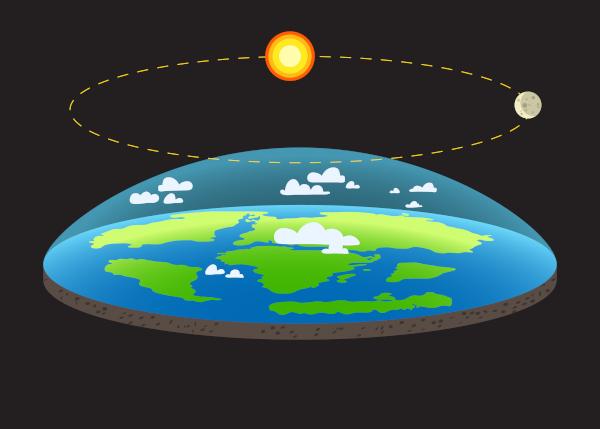Negationism is the act of denying a fact or set of facts normally accepted through scientific and academic conventions, due to a posture more linked to immediate sensory experience or simple belief, as well as the discomfort in relation to reality. Basically, the denial mind doesn't want to believe in something because it's uncomfortable or refuses to believe because of not knowing how to differentiate the knowledge rational scientific knowledge of common sense, believing that personal experiences constitute all possible truth.
Read too: Cave myth — allegory that talks about the knowledge of the truth
Definition of negationism and negationist posture

The denier is the one who simply does not accept an idea, judgment or fact presented by a scientific, academic or philosophical community as true. Usually, the judgments and ideals presented by such intellectual authorities result from more accurate analysis and methods of their fields and are acclaimed by members of these intellectual communities until they are accepted by convention.
No matter the level of scientific validity or the depth of the argument presented, the denial mind simply refuses to accept scientific facts as true.. The Dutch Jewish philosopher Baruch de Spinoza distinguished three genres of knowledge, namely:
imagination,
reason and
intuition.
It's the the first gender responsible for the origin of a good part of the negationist theories that we have today, as this genre carries something called “inadequate ideas”. We create these first ideas through our immediate sensory experience. These ideas are nebulous, obscure, because they still have not passed through the sieve of reason, but they are a form of knowledge. Staying in this first genre is the first step towards denial.
Imagine that a person sees the Sun rising and setting every day. Looking up at the sky, she immediately notices the Sun as a small clear disk traveling across the sky. Your immediate experience is that the Sun is countless times smaller than the Earth and that it is the Sun that moves around our planet, not the other way around. A person willing to learn and freed from the shackles of obscurantism studies, listens to other opinions and knows in science the whole structure behind the orbiting of the planets. The denier simply gets in touch with all this knowledge and ignores it, stating that this knowledge can only be wrong.
Origin of the term negationism
The origin of the term is French, because it was through French intellectuals that, for the first time, they dared to question the validity of a dark page in our history. It is known that the term was used to classify the first great contemporary denial movement: the deniers of Holocaust.
In 1944, the Jewish jurist Raphael Lemkin coined the neologism “genocide” to describe the Nazi treatment of concentration camp prisoners. The holocaust was the systemic persecution, imprisonment and annihilation of the Jewish population and resulted in the death of at least 6 million Jews between 1942 and 1945, most of them murdered in chambers of gas.
Maurice Bardèche and Paul Rassinier are examples of French far-right intellectuals who set out to write books and issue opinions in the media saying that the Holocaust was a scam. They claimed that the Jews inflated the reports and that most of the deaths were caused by guards and even the prisoners themselves. They also stated that the gas chamber did not exist. At other times, they even justified cruel practices against Jews. Then began the first negationist movement in our contemporary history and what came afterward tried to deny not only history but the natural sciences as well.

History's Denialism
In the 19th century, the French philosopher, “father” of sociology and founder of positivism, Auguste Comte, defended that history was composed of historical facts. On the same path was Scottish writer and historian Thomas Carlyle, who wrote the story of the great deeds of great heroes. Until then the story was very rigid, treated only as a set of facts from the past narrated and nothing else.
Was the German philosopher Friedrich Nietzsche who started to change this view about history, presenting perspectivism, understood through the excerpt of this posthumous fragment left by the thinker in his estate: “there are no facts, only interpretations”. Nietzsche wanted to say that history is not a rigid set of facts, nor that knowledge is made with such rigidity, but that we have the side of the individual perspective, of a being in the world who sees the world through his own lens and creates narratives based on this eyesight.
In the 20th century, other visions further developed what Nietzsche started, such as the genealogy of Foucault. There was also a historical school, the Annales School, which significantly broadened the vision of history.
My goal throughout the paragraph above is to show that History, as a science, is not exact. It is open to interpretation and even revisions.. History revisionisms are necessary, as long as they are based on rigorous methods of analysis. It is possible to doubt a historical event, and skeptical doubt is even the first step towards doing science. However, doubting cannot be the same as denying something evidenced, proven through years of serious research.
The greatest enemy of historians today are movements that create conspiracy theories around historical facts. some intend politics (History's denial discourse infuses a horde of sectarian followers who guarantee support for a leader or movement), and the internet has served as a domain expansion tool for these leaders and movements denialists. Then we see those who deny that there was a military dictatorship in Brazil, for example, claiming that the military regime would have been a necessary intervention and never acted in a dictatorial way, in the eyes of these people. Others deny that there was a Holocaust, others (mostly whites) deny that there is racism and structural racism, others, in a more foolish way, deny that US astronauts have stepped on the Moon, and so on.
Read too: 4 facts that prove man's arrival on the moon
science denial
Amid the pandemic of çovid-19, there were those who denied the existence of the virus. Likewise, others deny the scientific community's consensus on how to fight the virus (distance, isolation, vaccination and use of masks, as well as constant hand hygiene). That posture was maintained by some political groups in the world as a way to establish power through the rational fragility of followers, but it is not new.
In the 15th century, the Catholic Church was the great denier of science. He sentenced the philosopher Giordano Bruno to death, he sentenced the philosopher and physicist to imprisonment Galileo Galilei and pursued scientists such as Nicolaus Copernicus.
In the 20th century, the delusions of science denials resurface with:
the anti-vaccination movements;
the earthmoving movements;
the deniers of muclimatic dances; and
the deniers of pandemic.
To explain this behavior, we can resort to Spinoza's inadequate idea structure, as we did in the first topic of this text. The question that remains is: why? Well, in addition to the confusion of data from experience that have not yet passed through the sieve of rationality, proposed by Spinoza, there is the comfort/discomfort factor. The reality is often uncomfortable.
Accept that my senses deceive me when I see the flat horizon in the Ocean is uncomfortable, just as it is uncomfortable to allow a needle with a foreign liquid to enter on my body or wear a face mask for hours (and properly, covering mouth and nose). It is uncomfortable for human beings to accept that they are wrong, that part of the tradition he follows is wrong and that the original knowledge he gained alone deceived him. So, for a denier, if he doesn't feel the highest temperature, there is no global warming, besides being uncomfortable to have to emit less greenhouse gases.

Contemporary Denial Movements
Among the denials of history and science, we have some contemporary movements. Powered by fake news and conspiracy theories, these movements have gained some prominence in recent years because of the internet.
HIV/AIDS Denialism
In fact, this movement had greater prominence in the 1980s/90s (although it's not over, oddly enough), when not much was known about HIV and AIDS.
Some speculated that the virus did not exist and that what was called AIDS was the result of the combination of a sex life, in their opinion, promiscuous with bad nutrition and the use of drugs injectables, or even the effect of hemophilia. Others already said that the HIV virus was a virus like any other, which did not cause AIDS and would disappear from the host's organism.
Anti-vaccines
Anti-vaccination movements have been in the world since the vaccine was raised. When the Brazilian sanitarist Oswaldo Cruz ordered the compulsory vaccination of cariocas, there was one of the most bizarre episodes in the history of Brazil, the Vaccine Revolt.
The year was 1904, vaccines were not widely known by the population, there was no explanation and dialogue between health authorities and the population and the popular revolt seemed to make some sense then, but then. Today we have information and studies on vaccines, in addition to having eradicated diseases with mass vaccination. Even so, anti-vaccination movements have been growing.
Terraplanners
There are deniers of Physics and of the geography who claim that the Tmiss is flat. Some even complete a package, inserting a kind of geocentrism, therefore, to explain the rising and setting of the Sun around the terrestrial “disk”, they affirm that the Sun is the one that moves around the Earth.
Covid-19 Deniers
These, very recent, do not believe in the existence of the virus or create the most outlandish conspiracy theories about the disease, in addition to talking about cures through drugs that have not been proven to be effective by science.
by Francisco Porfirio
Philosophy teacher
Source: Brazil School - https://brasilescola.uol.com.br/o-que-e/o-que-e-sociologia/o-que-e-negacionismo.htm

